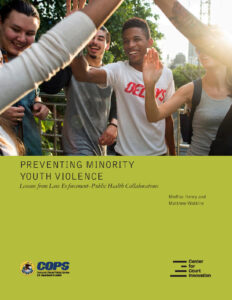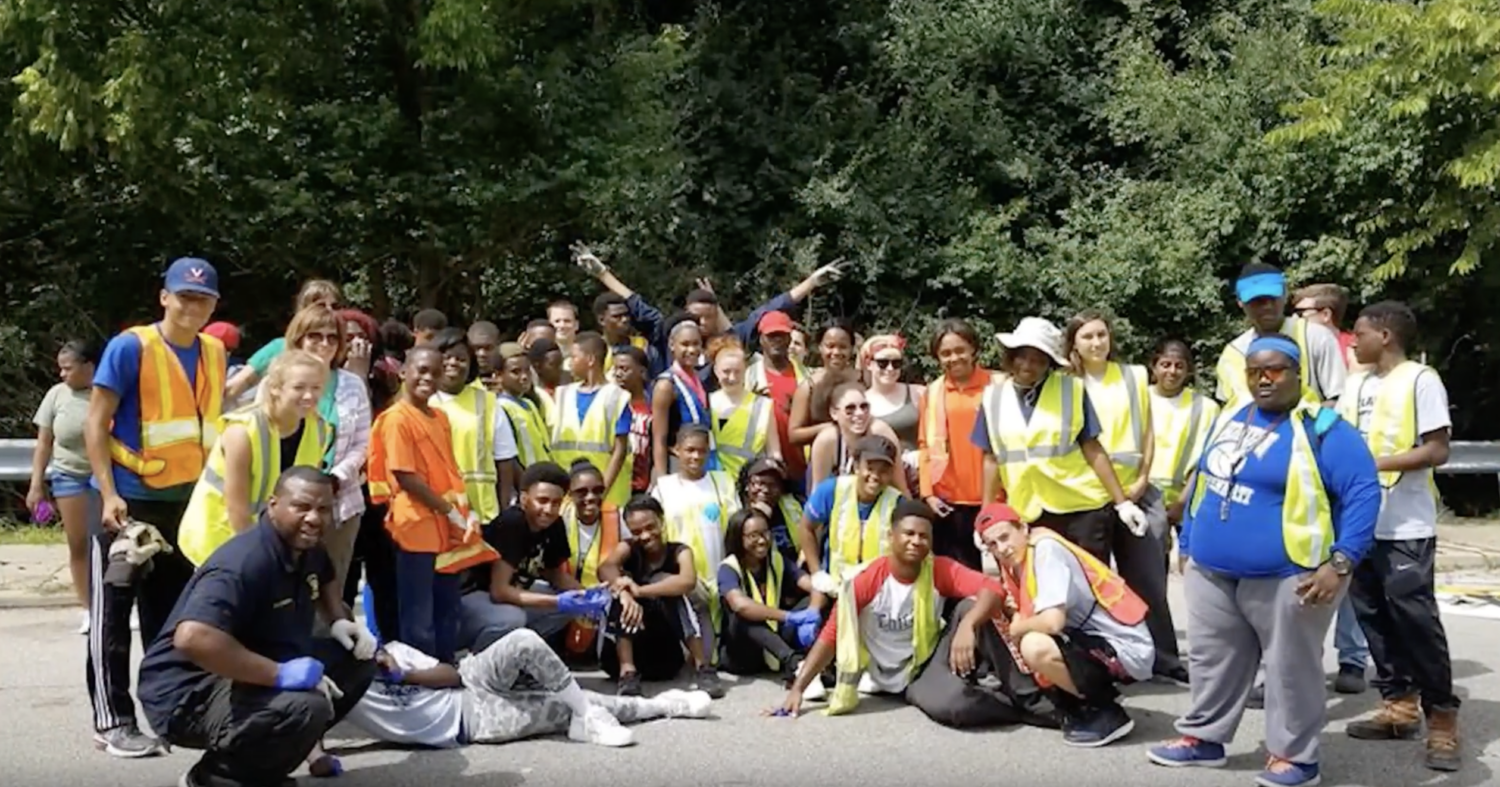With a focus on treating violence as a disease, this initiative links public health agencies, community groups, and law enforcement in an effort to curb violence.

While violent crime rates across the United States have fallen over the past two decades, violence continues to pose a major threat to the health and well-being of many communities, disproportionately affecting racial and ethnic minority populations. In response, the Office of Minority Health at the U.S. Department of Health and Human Services and the Office of Community Oriented Policing Services at the U.S. Department of Justice created the Minority Youth Violence Prevention Initiative to engage public health organizations, law enforcement agencies, and community-based groups in an effort to curb violence and reduce disparities in access to public health among at-risk minority youth.

The initiative reflects an emerging body of research and practice that treats violence as a disease, linking public health agencies with law enforcement to approach violence from a public health perspective.
The Center for Court Innovation was selected to serve as the site coordinator, technical assistance provider, and evaluator for the initial round of nine demonstration sites. See here to read a summary of a roundtable on ‘Community Violence as a Population Health Issue’ featuring a discussion of the initiative, and here for a report from the summit in March 2017 marking the final year of the program’s first round.
In The News
- The summer enrichment program at Cabarrus STARS is highlighted in an article from the Salisbury Post.
- TV station WBNG Binghamton covers the announcement of a Minority Youth Violence Prevention grant to the Binghamton Community and Schools Together program.
- Savannah Morning News profiles the Mock Trial Competition for at-risk youth participants in Chatham County’s Youth Intercept Program.
- The blog of the Office of Minority Health and Community Policing Dispatch, the e-newsletter of the COPS Office, cover kickoff of Minority Youth Violence Prevention Initiative.
- The Office of Minority Health announces a $3 million grant in partnership with the COPS Office to create the Minority Youth Violence Prevention Initiative.
Demonstration Sites
Cabarrus STARS (Students Taking a Right Stand)
Cabarrus County, North Carolina
The Cabarrus STARS program is overseen by the Cabarrus Health Alliance, a public health authority, in partnership with the Cabarrus County Sheriff’s Office, Concord Police Department, Kannapolis City schools, and Cabarrus County schools. Cabarrus STARS is a school-based youth leadership program for males aimed at creating a healthy, positive school community through mentorship and positive role modeling. Key activities for this initiative include youth development, academic enrichment activities, service learning, tutoring, case management, and in-home parent resources. Through Cabarrus STARS’ partnership with local law enforcement, the police department’s Student Resource Officers serve as mentors and assist with youth programming.
Integrating Public Health with Community Policing to Prevent Minority Youth Violence
DeKalb County, Georgia
Integrating Public Health With Community Policing to Prevent Minority Youth Violence is led by the DeKalb County Board of Health, in partnership with the Clarkston Police Department, DeKalb County Police Department, and DeKalb County Human Development Department. The goal of this project is to reduce low-level “gateway” violence and crimes perpetrated by minority youth through a comprehensive public health approach to violence prevention. Sports and recreational activities, civic learning, individual mentoring, and summer programs for at-risk youth are provided by the DeKalb County Police Department’s Police Athletic League. The project will convene an action group of public health, law enforcement, education, youth, and social service agencies to identify additional collaborative approaches, establish a small grants program to provide financial assistance to support early intervention and prevention programs, and build public knowledge about crime and delinquency through community awareness events.
Youth Intercept: A Violence Prevention Program
Chatham County, Georgia
The Chatham County District Attorney’s Office directs Youth Intercept, a violence-prevention program that aims to break the cycle of youth violence and retaliation. Youth Intercept provides educational services and referrals to public health services to at-risk youth, particularly African-American males between the ages of 10 to 18. Youth Intercept conducts its work in partnership with Memorial Health University Medical Center, Chatham County Juvenile Court System, Chatham County Sheriff’s Department, and Chatham County Public Schools. Key activities include a hospital-based violence intervention program for youth injured by violence and a school-based youth development program for students with a history of truancy or behavioral issues, as well as tutoring, career awareness, referrals for counseling, case management, and other services.
Minority Youth Violence Prevention Through Trauma Response Project
Alameda County, California
The Minority Youth Violence Prevention Through Trauma Response Project is led by the community-based organization Youth ALIVE!, in collaboration with the Oakland Police Department, Alameda County Probation Department, and the Alameda County Health Care Services Agency. Youth ALIVE! developed and disseminated the nation’s first hospital-based violence intervention program and model, “Caught in the Crossfire.” The Minority Youth Violence Prevention Through Trauma Response Project targets three demographic groups affected by interpersonal violence and at risk for Post-Traumatic Stress Disorder: youth who had a close relationship with murder victims; youth injured by violence who were treated in and referred by Alameda County’s three trauma centers; and formerly incarcerated youth referred by probation upon reentering the community. Key activities include crisis intervention, peer-based mentoring, case management, trauma screening and interventions, mental health services, and referrals to health services. Project staff convene weekly with partners to assess recent violent incidents, discuss support plans, and track cases’ progress.
Children in Trauma Intervention (CITI) Program
Cincinnati, Ohio
The Children in Trauma Intervention program is spearheaded by the Cincinnati Police Department’s Youth Services Unit in partnership with the Cincinnati Health Department, Cincinnati Public Schools, and Hamilton County Juvenile Court. CITI seeks to reduce violence and youth involvement in the juvenile justice system through a mentorship program that pairs police officers with youth. Key activities include providing health evaluations, trauma-informed care, social work counseling, youth development, and reproductive healthcare workshops for youth, as well as leadership and pro-social skills workshops.
Policing Approach Through Health, Wellness and Youth (PATHWAY)
West Palm Beach, Florida
Policing Approach Through Health, Wellness and Youth is an initiative led by the City of West Palm Beach. Partners for the project include the West Palm Beach Police Department, Florida Department of Health Palm Beach County, C.L. Brumback Primary Care Clinics, Health Care District Palm Beach County, and the Palm Beach County Criminal Justice Commission. PATHWAY aims to promote healthy adolescent development, discourage harmful and violent behavior, and provide youth with opportunities for positive social involvement. Key activities include providing health and wellness classes, career and financial counseling, referrals to health care and social services, service learning opportunities, audio/visual technology training, and tutoring. Through the program, police officers serve as mentors and instructors and work alongside participants in community service projects.
Stand Up Participate (SUP) Initiative
Hennepin County, Minnesota
The Stand Up Participate initiative is led by the community-based organization Asian Media Access, Inc. in partnership with the Hennepin County Sherriff’s Office, Minneapolis Police Department, Brooklyn Park Police Department, Hennepin County Public Health Department, Minneapolis Public Health Department, and Brooklyn Park Health Department. SUP helps youth acquire skills for self-sufficiency, improve self-esteem, and develop cultural pride. The program also seeks to reduce violent crime and improve the health and well-being of communities of color by improving access to public health services and building an understanding of violence’s impact. Key activities include audio/visual technology training, culturally based family engagement programming, health education, and an entrepreneurship program. SUP also facilitates community activities to foster cultural awareness and to improve community-police communication and understanding.
The Sacramento Minority Youth Violence Prevention Initiative
Sacramento, California
The Sacramento Minority Youth Violence Prevention Initiative is a multi-sector collaborative program led by the Health Education Council, a private-public health organization, and the Sacramento Police Department, Sacramento Sheriff’s Department, Sacramento County Public Health Department, Kaiser Permanente, Sacramento City Unified School District, Elk Grove Unified School District, and the Boys and Men of Color Collaborative. The Sacramento Minority Youth Violence Prevention Initiative supports three core programs: the Male Leadership Academy (a school-based youth leadership program that addresses the physical, social, and emotional needs of minority male youth); the Summer Night Lights program (an initiative aimed at building a sense of community and creating safe opportunities for youth to become active during the summer); and the Sacramento Violence Intervention Program (a hospital-based violence intervention program for youth victims of violence). The Sacramento Minority Youth Violence Prevention Initiative aims to integrate these core programs and expand the reach of Sacramento’s public health and community policing practices.
Binghamton Community and Schools Together (BCAST)
Binghamton, New York
The Binghamton Community and School Together program is led by the Lourdes Youth Services, a public health organization, in collaboration with the Binghamton Police Department, Broome County Health Department, and the Broome-Tioga Board of Cooperative Educational Services. BCAST seeks to divert high-risk youth from gang involvement and violent behavior through restorative strength-based programming. Key activities include weekly lunch-time groups at three area schools–co-facilitated by Student Resource Officers–that teach coping skills to young men and help build positive relationships with law enforcement; after-school programming; and monthly dinners for BCAST participants and their families hosted by a parent-engagement specialist.
Disclaimer: This web page is funded in part through a grant from the Office of Community Oriented Policing Services (COPS), Office of Justice Programs, US Department of Justice. The opinions contained herein are those of the authors and do not necessarily represent the official position or policies of the US Department of Justice. References to specific agencies, companies, products, or services should not be considered an endorsement by the author(s) or the US Department of Justice. Rather, references are illustrations to supplement discussion of the issues.
